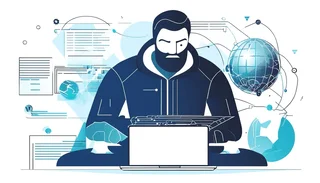Overview of the Microsoft MS-500 Exam
The Microsoft MS-500: Microsoft 365 Security Administration exam is a critical certification for IT professionals focusing on securing Microsoft 365 environments. This exam evaluates a candidate's ability to implement and manage security measures, identity protection, threat detection, information governance, and compliance solutions within Microsoft 365.
DumpsBoss provides high-quality study materials, including practice questions, exam dumps, and expert guides, ensuring that candidates can thoroughly prepare and pass the MS-500 exam with confidence. Understanding VoIP security is an essential aspect of this certification, as securing voice-over-IP (VoIP) communications is crucial in modern business environments.
Understanding VoIP Security Risks
Voice over IP (VoIP) technology allows voice communication over the internet, offering cost savings and flexibility compared to traditional telephony. However, VoIP systems are susceptible to several security risks, including:
-
Eavesdropping – Unauthorized interception of VoIP calls, leading to potential data breaches and loss of sensitive information.
-
Denial of Service (DoS) Attacks – Malicious actors can flood a VoIP network with excessive traffic, making services unavailable to legitimate users.
-
Spoofing and Phishing – Attackers can disguise themselves as trusted users to trick individuals into revealing sensitive data or making fraudulent transactions.
-
Malware and Ransomware – VoIP systems can be targeted by malware that disrupts communication, encrypts data, or compromises system integrity.
-
Man-in-the-Middle (MitM) Attacks – Hackers can intercept and manipulate VoIP communications, altering messages or injecting harmful data.
Understanding these threats is essential for IT professionals preparing for the MS-500 exam, as securing VoIP infrastructure is a key component of enterprise security strategies.
Technologies to Protect VoIP Against Eavesdropping
To safeguard VoIP communications from unauthorized access and interception, businesses must deploy advanced security technologies. Some of the most effective solutions include:
-
End-to-End Encryption (E2EE) – Encrypting VoIP traffic ensures that only authorized users can access the conversation, preventing eavesdropping.
-
Session Border Controllers (SBCs) – SBCs act as security gateways, filtering and monitoring VoIP traffic to detect and block potential threats.
-
Virtual Private Networks (VPNs) – Using VPNs to encrypt VoIP traffic enhances security, especially for remote employees and mobile users.
-
Secure Real-Time Transport Protocol (SRTP) – SRTP provides encryption and authentication for VoIP communications, mitigating the risk of data interception.
-
Multi-Factor Authentication (MFA) – Enforcing MFA for VoIP access prevents unauthorized login attempts and strengthens overall security.
-
Network Firewalls and Intrusion Detection Systems (IDS) – Implementing firewalls and IDS solutions helps detect and prevent unauthorized VoIP traffic and potential attacks.
DumpsBoss offers comprehensive study resources covering these security technologies, ensuring that MS-500 candidates have the knowledge required to implement robust VoIP security measures.
Best Practices for VoIP Security
To enhance VoIP security and minimize vulnerabilities, IT administrators must follow industry best practices. Key strategies include:
-
Regular Software Updates and Patch Management – Keeping VoIP software and devices up to date mitigates the risk of exploiting known vulnerabilities.
-
User Training and Awareness – Educating employees about phishing scams, social engineering, and secure communication practices reduces the likelihood of security breaches.
-
Implementing Strong Authentication and Access Controls – Using strong passwords, MFA, and role-based access control (RBAC) limits unauthorized access to VoIP systems.
-
Monitoring and Logging VoIP Traffic – Continuously monitoring VoIP networks and analyzing logs helps detect and respond to suspicious activities promptly.
-
Segmenting VoIP Traffic from Data Networks – Separating VoIP traffic from the main corporate network improves security and prevents unauthorized access.
-
Disabling Unused Features and Services – Reducing attack surfaces by disabling unnecessary VoIP features and services helps minimize security risks.
-
Deploying Secure SIP Trunking – Secure SIP trunking solutions enhance VoIP security by encrypting and authenticating SIP communications.
By implementing these best practices, organizations can strengthen VoIP security and protect sensitive communications from cyber threats. DumpsBoss provides in-depth training materials covering VoIP security best practices, helping candidates excel in the MS-500 exam and apply their knowledge in real-world scenarios.
Conclusion
The Microsoft MS-500 exam is a crucial certification for IT security professionals tasked with securing Microsoft 365 environments, including VoIP communications. Understanding VoIP security risks, implementing advanced protection technologies, and following best practices are essential components of enterprise cybersecurity.
DumpsBoss offers high-quality exam preparation materials, ensuring that candidates have the expertise needed to pass the MS-500 exam and apply security solutions effectively. By leveraging DumpsBoss resources, professionals can enhance their knowledge, advance their careers, and contribute to secure and resilient business communication systems.
Special Discount: Offer Valid For Limited Time “MS-500 Exam” Order Now!
Sample Questions for Microsoft MS-500 Dumps
Actual exam question from Microsoft MS-500 Exam.
Which technology can be used to protect VoIP against eavesdropping?
A) SSL/TLS
B) VPN
C) IDS/IPS
D) NAT


